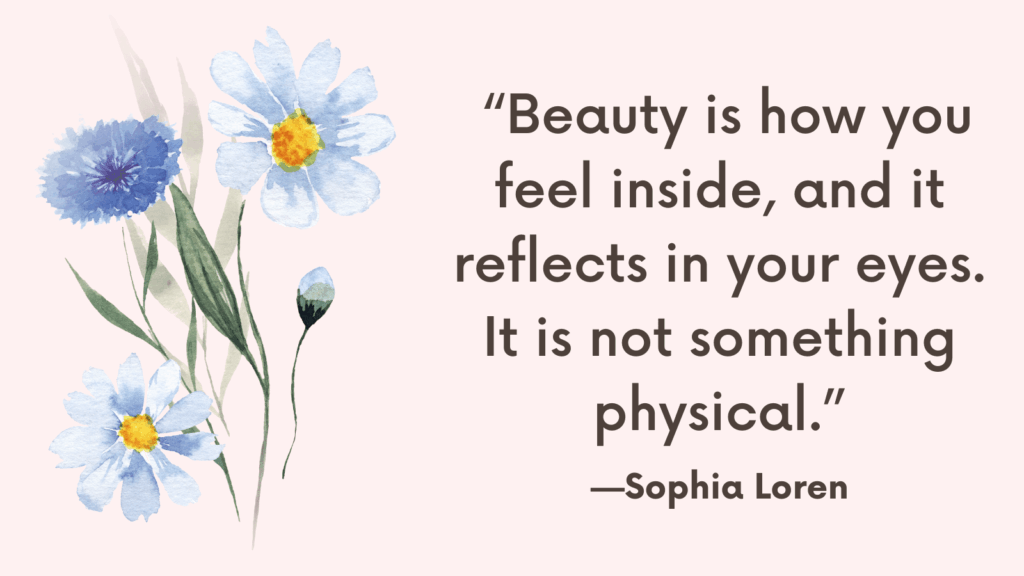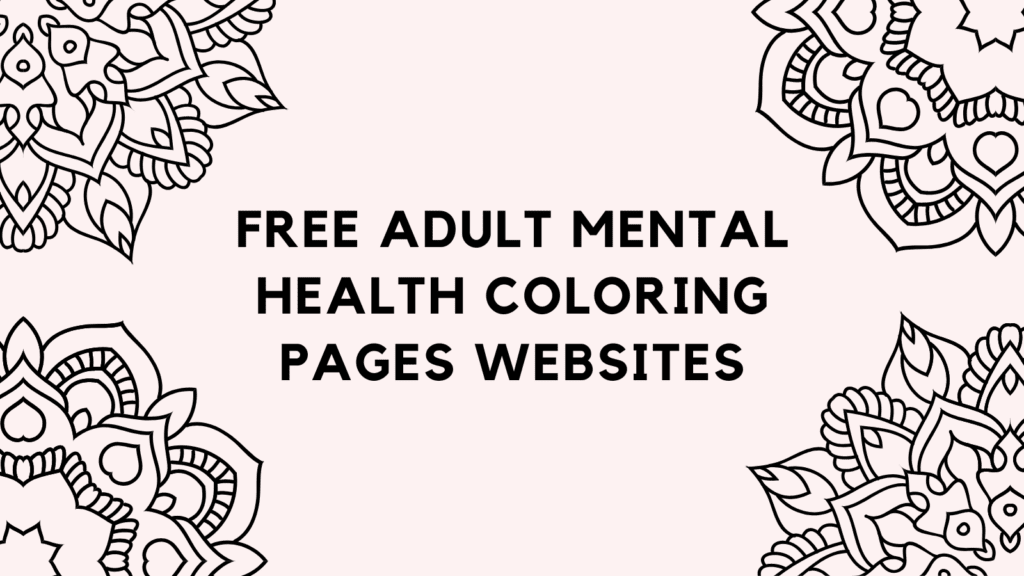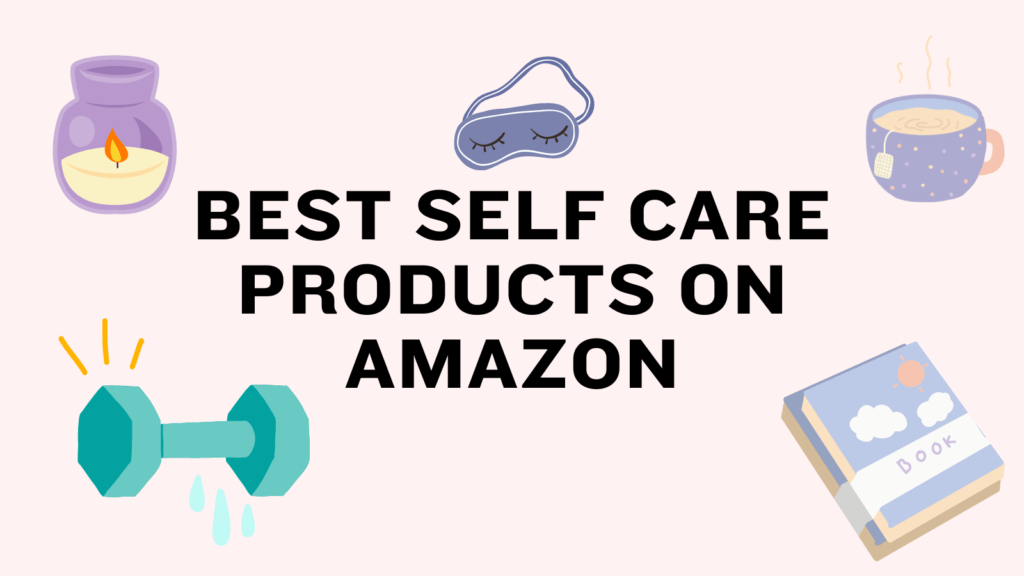Today, you’ll learn all about the 6 types of self care to help you make yourself a priority.
Taking care of yourself is not as selfish.
Life can be hard at times.
And challenges can tax your emotional health.
This is why you need to start taking care of yourself to navigate stressors in a healthy and productive way.
- What Is Self-Care?
- SELF-CARE QUESTIONNAIRE
- 6 Types of Self Care
- PHYSICAL SELF-CARE
- INTELLECTUAL SELF-CARE
- MENTAL SELF-CARE
- EMOTIONAL SELF CARE
- SOCIAL SELF-CARE
- SPIRITUAL SELF-CARE
- Free Printable Worksheets For Self-Care (PDF)
- How Can You Practice Self-Care Every Day Even When Time Is Hard to Find?
- The Big List of Self-Care Ideas PDF
What Is Self-Care?
Self-care is an assertion of consciousness: the choice to think independently and to have the courage to live by our own mind
Self-care is a willingness to know not only what we think but also what we feel, want, and need—and to accept our right to experience such feelings.
Self-care is attitude of self-acceptance— without self-oppression or any pretense about the truth of our own being.
Self-care is about falling in love with our own life and our possibilities for growth and for experiencing joy.
Related: Healthy Boundaries Quiz (+Free Pdf Worksheets)
Self-Care Is Healthy, but Not Always Enjoyable
Self-care is often confused with self-indulgence and only doing thing that are enjoyable and fun.
But self-care isn’t always fun. Going to therapy is a form of self-care because you’re taking care of your mental health, but it may involve exposure and triggers that make you feel worse before you can feel better.
Self-care is doing what’s good for us and meeting our own needs. Eating a bag of potato chips can be self-indulgence but it’s not self-care.
Related: Top 35 Boundaries Affirmations To Help You Become More Assertive
SELF-CARE QUESTIONNAIRE
1. Are making healthy food choices?
2. Are you sleeping well?
3. Are you exercising regularly?
4. Do you have a counselor, or trusted friend to talk to?
5. Are you making time for journaling and self-reflection?
6. Do you practice mindfulness regularly?
7. Are you managing stress effectively?
8. Do you have a regular gratitude practice?
Related: Best 9 Tips On How To Receive More In Life And Relationships?
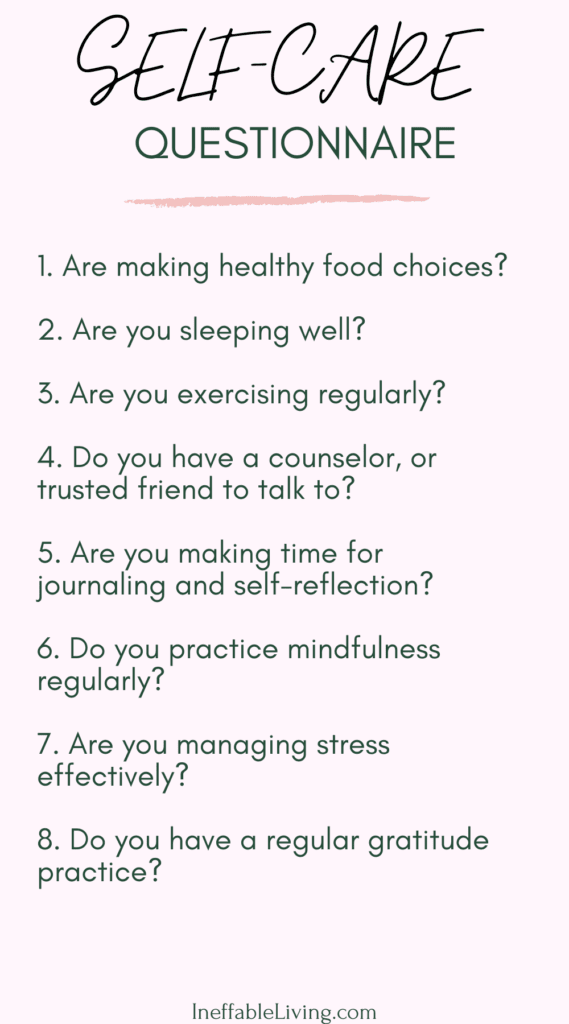
Why is Self-Care Important For Your Mental Health?
Living in a chaotic, fast-paced world, self-care is your way to reclaim and reestablish your own balance.
Practicing self-care helps decrease stress and anxiety and gain fulfillment.
It also increases your self-love. As you give love to yourself your self-esteem and confidence rises.
Related: How To Start A Self Love Journey? Top 10 Powerful Ways to Love Yourself More
Where To Start With Self Care?
Self-care is a personal, individual journey.
There’s no “right” or “wrong” way to practice self-care.
As you go through self-care ideas, choose the ones that are relevant to what you’re going through now.
For example, if you’re grieving, you might find yourself drawn to emotional self-care.
If you’re seeking to deepen your self-awareness, you might want to focus on intellectual self-care.
If you’re seeking to nurture your body, physical self-care is the answer for you.
If you’re looking to connect to higher energy, spiritual self-care can help you with that.
Related: Top 39 Self Love Mantras To Practice Daily (+9 Ways To Grow In Self-Love)
Challenge You Negative Beliefs About Self-Care
When you believe that self-care is selfish, or a waste of time, or wrong in general, you may end up feeling guilty when you engage in it.
The first step in your self-care journey is to change the limiting beliefs you have about self-care and replace them with more realistic ones.
Ask yourself if you’re actually doing something wrong by taking care of your physical, mental, or spiritual health?
Often, we find it easier to be understanding and compassionate with other people than with ourselves.
If you find it hard to answer that question, try imagining a dear friend in the same situation having the same beliefs, what would you tell them?
Related: Best 30 Day Self Love Challenge (+FREE Worksheets PDF)
Create a Self-Care Plan
Self-care is a habit that requires commitment and effort. Without a plan, we may let it fall to the bottom of our to-do list.
Create a self-care plan that meets your unique needs.
1. Identify your needs
Our bodies and feelings give us feedback about what’s going on around and within us and tell us what we need.
You need to slow down and listen to them.
Take a moment to answer the following question:
- How do I feel right now? Name your feelings and try to be as descriptive as you can.
- How does my body feel? Notice any tension, pain, temperature, heart rate, breathing, and so forth.
- What do I need right now to bring myself back to wellness?
Some common human needs may include:
- food and water
- sleep
- physical activity or exercise
- rest or relaxation
- play or recreation
- safety (physical and emotional)
- belonging and social connection
- sense of purpose
- self-worth
- self-control
- self-expression
- connection to a higher power or something larger than yourself
- knowledge or understanding
2. Decide how best to meet your needs
Once you’ve identified what you need, start choosing self-care activities that will help you meet those needs.
Related: Top 23 Self Love Questions (+FREE Self-Love Resources)
The following are some ideas:
6 Types of Self Care
1. Physical self-care: This involves taking care of your body by getting enough sleep, exercising regularly, eating a healthy diet, and attending regular medical checkups.
2. Intellectual self-care: This involves stimulating your mind by engaging in activities that challenge your intellect, such as reading, learning new skills, or pursuing a hobby that interests you.
3. Mental self-care: This involves taking steps to reduce stress, manage your thoughts, maintain healthy relationships, and promote overall well-being.
4. Emotional self-care: This focuses on taking care of your emotional wellbeing by identifying and expressing your feelings, managing stress levels, and developing positive coping mechanisms.
5. Social self-care: This involves nurturing your relationships with others by spending time with loved ones, joining social groups, and reaching out to others for support when needed.
6. Spiritual self-care: This connects you with your spiritual beliefs by engaging in activities that fulfill your spiritual needs, such as meditation, prayer, or connecting with nature.
PHYSICAL SELF-CARE
Movement
Moving your body increases endorphins and other mood-boosting brain chemicals. This helps increase your energy and decrease stress and anxiety.
1. Sweat Your Way to Relaxation
Heat has an incredibly restorative and relaxing effect.
Seek out a sauna or spa or even your local gym, and allow the sweat to cleanse your body of impurities.
2. Join a Community Sports League
Engage your competitive side in a healthy way by joining a sport of your choosing like soccer, basketball, tennis, volleyball, etc.
Just remember that it doesn’t matter who wins, the goal is to have fun and get your body moving.
3. Yoga
The benefits of yoga extend far beyond physical health. Yoga also helps increase your focus, decrease stress and anxiety, and increase your sense of wellness.
Browse these yoga poses and choose what could work best for you.
You can also use phone apps like, Daily Yoga (iPhone/ Android), Yoga Studio (iPhone/ Android), Down Dog (iPhone/ Android), Glo (iPhone), Yoga – Track Yoga (Android), Yoga for Beginners (iPhone), Yoga Daily Fitness (Android).
Related: Best 18 Self Compassion Journal Prompts (+FREE Worksheets)
4. Stretch
Stretching isn’t just a great way to keep your muscles limber and flexible, but it helps calm your mind and release tension.
Make stretching an essential part of your wellness routine.
Here are 21 Best Stretching Exercises for Better Flexibility
5. Walk
Walking is a great stress-relieving activity that anyone can incorporate into a daily routine – all you need is a pair of comfortable shoes.
Look for opportunities in your day to add more steps, like taking the stairs instead of the elevator, parking across the parking lot, etc.
Aim for 7,000–8,000 steps a day or 150 minutes of moderate walking a week, or thirty minutes, five times a week.
To help you track your steps and time spent walking, apps like Strava (iphone/Android), or google fit(iphone/Android), can help you with that.
Related: Best 25 Journal Prompts For Self Love And Confidence Building
6. Dance
Dancing can be a great way to remove the feeling of being self-conscious about your movement.
If you already dance without inhibition, you may want to perform this exercise in front of a mirror.
Find a song that makes you want to move and start dancing!
7. Get a Massage
A massage might sound luxurious and self-indulgent, but it is also a self-care necessity.
Massage helps reduce muscle pain and tension, reduce stress, and relax your body.
You can book yourself a massage or you can administer massage on yourself.
Self-Administered Massage
Foot Massage
1. Get a tennis or a golf ball lean on a wall for balance.
2. Place the tennis ball under one foot.
3. Slowly roll your foot on top of the ball. Focus on the arch of your foot, your heel, the ball of your foot, and your toes.
4. After one or two minutes, then switch to the other foot.
Hand Massage
1. Apply a liberal amount of your favorite lotion onto your hands.
2. Using your thumb, rub the palm of the other hand.
3. Pull each finger of your hand gently away from the palm to stretch fingers.
4. Push your hand backward and press to stretch your wrist.
5. Do the same for the other hand.
Related: How To Be Gentle With Yourself? Top 5 Ways To Practice Self-Compassion
8. Wear Something Comfortable
Looking good should start with feeling good.
Before buying a piece of clothing, ask yourself the following questions:
- Does it fit me comfortably at my current weight?
- Does the fabric and zippers/buttons/elastic feel good against my skin?
- Can I move comfortably in this clothing?
- Does this clothing fit my personality?
9. Draw a Bath
If your mind is cluttered from the demands of your day-to-day life and your muscles are sore from all of the physical activities of the day, warm water can alleviate your ailments.
You can add Epsom salts to ease the ache of your sore muscles.
Related: Top 18 Self Esteem Exercises (+FREE CBT For Self-Esteem Worksheets PDF)
10. Soak up the Sun
Sunshine matters a lot, not just to your physical health, but also to your emotional and mental health. (1)
But how sun much is needed?
Researchers have estimated the duration of sunrays exposure required in order to obtain enough vitamin D to be 10 to 20 minutes in spring and summer, and almost two hours in the winter months. (2)
11. Drink Enough Water
It’s important to keep your body hydrated.
But how much water is enough?
The National Academies of Sciences, Engineering, and Medicine determined that an adequate daily fluid intake to be about 15.5 cups (3.7 liters) of fluids for men and about 11.5 cups (2.7 liters) of fluids a day for women.
But the amount of water we need to drink each day can vary depending on the physical activity, the weather, having an illness particularly one accompanied by fever, vomiting or diarrhea. You should also keep in mind that food typically accounts for about 20 percent of fluid intake. (3)
Water is also one of the most underrated weight loss methods. One study revealed that drinking 500 ml of water (16.9 oz bottle) increases metabolic rate by 30% in 40 minutes. (4)
12. Enjoy Some Black Tea
Give yourself a restorative break and drink some black tea. One study shows that daily cups of back tea can help you recover more quickly from the stresses of everyday life. (5)
Bring your tea outside for the added benefit of a little fresh air on your break!
13. Treat Yourself to Some Chocolate
Studies show that consuming dark chocolate that has a high concentration of cacao (minimally 70% cacao, 30% organic cane sugar) helps lower blood pressure, reduce stress levels, boost your mood, and strengthen your immunity. (6)
14. Beauty Ritual
Create your own beauty ritual to take care of your skin.
If you don’t have a beauty ritual in place or are looking for more ideas, you can borrow the rituals and routines listed below and later tweak them to make them your own.
Commit to performing your ritual at least three times a week.
18. Don’t Skimp on the SPF
It’s important to take care of your skin, but it’s even more important to protect it. Exposure to UV rays can cause premature aging of the skin and signs of sun damage such as wrinkles, leathery skin, liver spots, etc.
Make sure to wear sunscreen and reapply it every hour or so when you are in the sun.
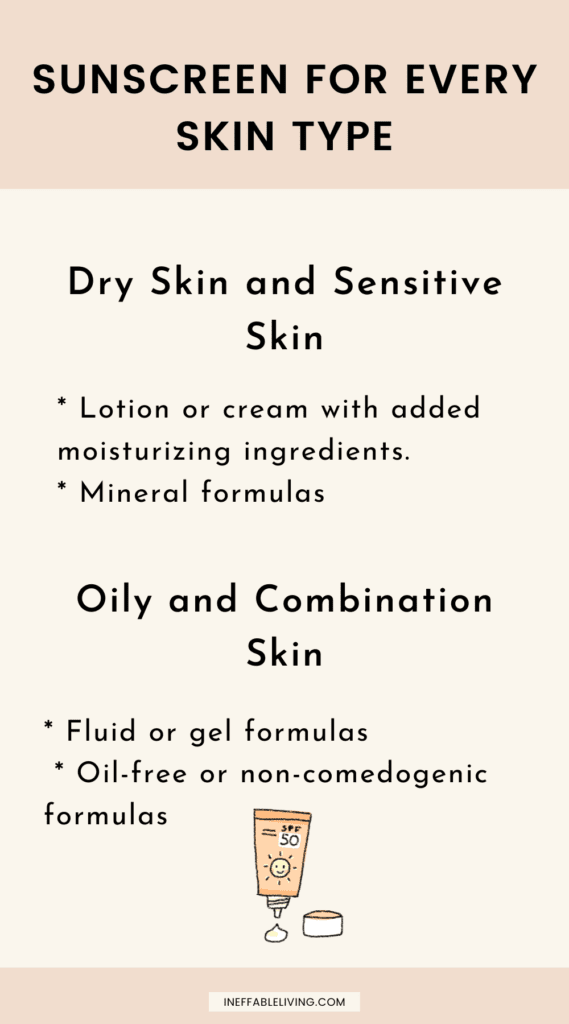
16. Keep Your Hair Healthy + Strong
The best way to approach a haircare routine is to make sure that your scalp is healthy and that your hair is protected.
SCALP CARE
Try to limit washing your hair to two to three times a week to allow the production of the natural oils that keep your scalp healthy.
Once a week, exfoliate your scalp to stimulate it, remove buildup, and let new hair grow in a healthy scalp.
For that you can use a silicone scalp-massaging shampoo brush or a simple at-home exfoliating scrub (one part raw cane sugar, three parts conditioner and a few drops of tea tree oil).
HAIR CARE
Invest in a good shampoo and conditioner made for your hair type.
Make sure they’re hypoallergenic and fragrance-free to avoid irritation.
If you use heat to style your hair, add argan oil to your post-heat routine. Argan oil is lightweight and will keep your hair moisturized.
17. Get a Restful Sleep
Going to bed early isn’t enough to wake up energized and well-rested. The quality of your sleep matters, too.
To improve the quality of your sleep, try implementing an easy, enjoyable bedtime routine. Anything from reading for a few minutes to taking a long bath, or meditating. Try to go to bed at the same time every night. Stop consuming caffeine six hours before going to bed and turn off electronic devices an hour before bed time.
Pro Tip: Fall asleep faster with Amber light. SOMNILIGHT offers a wide range of products that blocks blue light and help you fall asleep up to an hour faster. Use this link to receive a coupon code for 10% off any purchase. (Free U.S. shipping and 60-day money back guarantee.)
INTELLECTUAL SELF-CARE
18. Get Creative
Embrace your creative side and try hobbies that inspire you like painting, pottery, coloring, writing, knitting, etc.
19. Make Reading a Daily Habit
Try to spend at least 30 minutes a day reading something unrelated to your job or studies.
One study found that 30 minutes of reading lowered blood pressure, heart rate, and feelings of psychological distress just as effectively as yoga and humor did. (7)
Related: Top +100 Journal Prompts For Mental Health [+Free PDF Printable!]
20. “Reading” With Your Ears
Audiobooks are a great way to increase your knowledge on the go.
You can listen to audiobooks while driving, walking, working out, doing house chores, etc.
21. Make a Priority List
If you feel overwhelmed and your to-do list is growing longer, it’s time to make a priority list. Take a survey of your life and make note of different plans and projects that are half-finished. Decide which ones you need to complete and which ones can wait.
This will boost your productivity and help you get things done, but also will ease the stress.
Related: Top 21 Healing Journal Prompts To Support Your Healing Journey
22. Create a Vision Board
A vision board is a visual representation of the dreams and goals.
It’s a powerful tool that helps motivate you and focus your mind on achieving your desires.
1. Meditate for a few minutes while imagining in vivid details the things you want in your life (day-to-day routine, career, social life, love life, etc.)
2. Flip through magazines or search on the internet for pictures and words that fit your vision.
3. On a bulletin board or poster board, attach the pictures you’ve collected.
4. Put your vision board where you can see it every day.
23. Music
Music has the power to shift your mood and improve your memory and cognitive function.
Create a playlist of music that brings you joy and soothes you.
Related: Best 21 Evening Journal Prompts To Help You Relax & Unwind
MENTAL SELF-CARE
24. Journal
A journal is a safe place for you to work through your feelings, without judgments or criticism. It can serve as a confidant and guide.
Research shows that expressing your feelings on paper helps reduce your stress levels. (8)
You start exploring your feelings by writing them in your journal. It may be the pain of disappointment, loss, grief – anything that hurts you.
Writing about your pain may bring tears. This is a sign that you’ve hit a turning point and that continuing to write will help you open your heart and heal your wounds.
Many of us have learned to swallow our pain. Practicing journal writing consistently will help undo the self-censorship habit.
Related: Best 25 Night Journal Prompts To Help You Sleep Faster
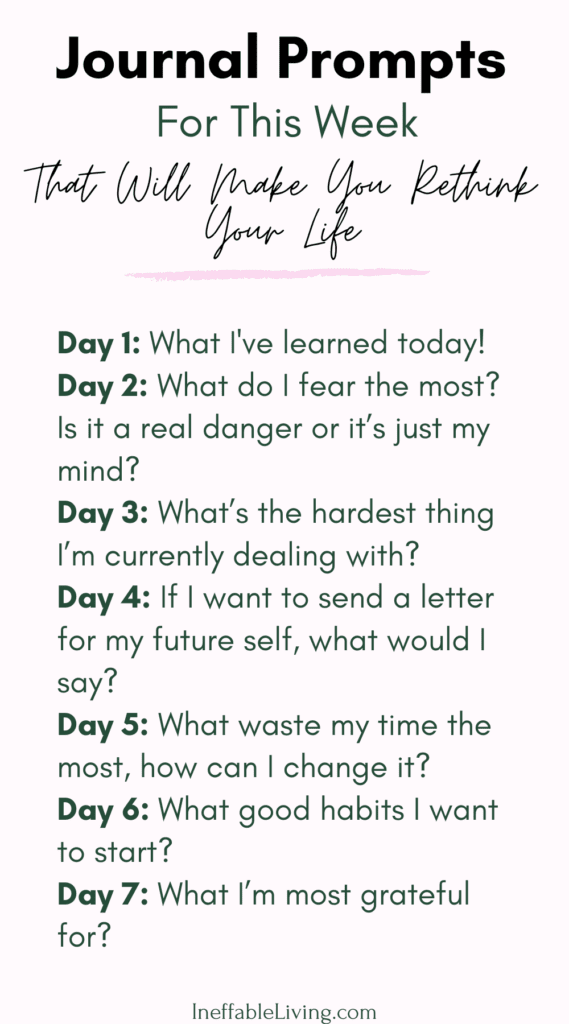
25. Keep A Gratitude Journal
Gratitude can be an instant mood-booster.
1. Every day, write down something you are thankful for.
2. Find more ways to express your gratitude to people around you.
Related: Top 21 Emotional Writing Prompts To Process Emotions
26. Track Negative Thoughts
Negative thoughts have a way of dragging your down into the dumps.
Challenging these negative thoughts and replacing them with more positive ones is one great act of self-care.
1. Each time you catch yourself dwelling on a negative thought, look for evidence that suggests that the negative voice is inaccurate or too extreme.
2. Imagining what you would say to a best friend who is in the same situation.
3. Remembering someone from you past or present who is supportive to you, and imagine them responding to your negative statements.
Related: Negative Core Beliefs List (& 8 Tips On How To Challenge Them)

27. Empower Yourself By Changing Your Vocabulary
When facing life challenges, we have two options, we either approach life from a position of power, or we approach it from a position of pain.
To move from pain to power, you need to change your vocabulary, replacing any destructive words you might be using with empowering ones have a powerful impact on the quality of your life.
For example, “I can’t” implies that you have no control over something, whereas “I won’t” makes the situation under your control and implies simply that it’s your choice that you won’t do it.
| Destructive words | Empowering words |
| I can’t I should It’s a problem Life is a struggle It’s not my fault What if? | I won’t I could It’s an opportunity Life is an adventure I’m fully responsible I can handle it |
28. Focus On Forgiveness
Holding onto grudges is like drinking a poison and expecting the other person to die.
Research links lack of forgiveness to anxiety and depression. (9) In one study, stress diminished when participant thought about forgiveness.
1. Think about someone you are feeling hurt by or disappointed in.
2. Write a letter to this person, visualize a conversation with them or write down everything you wish you could tell them.
It is okay if you decide not to send it, forgiveness isn’t about letting someone off the hook. It is about finding peace.
Related: Forgiving Someone Who Isn’t Sorry: 9-Step Guide To Free Yourself From The Past
29. Setting Boundaries
A boundary is the line you draw for yourself as to what you will and will not tolerate or accept in your life.
Setting healthy boundaries is essential, not just for your well-being, but also for maintaining healthy relationships.
Before setting boundaries, you need to believe the following statement: “I deserve respect.”
Repeating that statement and doing the following exercise will help solidify your boundaries.
Make two lists of “Safe” and “Unsafe” activities and people.
The safe list might include:
- People that make you feel emotionally safe
- A book that gets you to your “good place.”
- A song that resonates with you.
- Types of clothing that you like to wear.
- The amount of money that makes you feel financially secure.
- The values you want to live on
The unsafe list might include:
- Things people do that make you feel disrespected
- Values that go against your own
- People who are toxic to you
- Addictions you struggle with
Having clear lists will help you focus on what makes you feel safe and steer away from what doesn’t.
Related: How to Set Boundaries? 5 Steps to Establish Healthy Emotional Boundaries
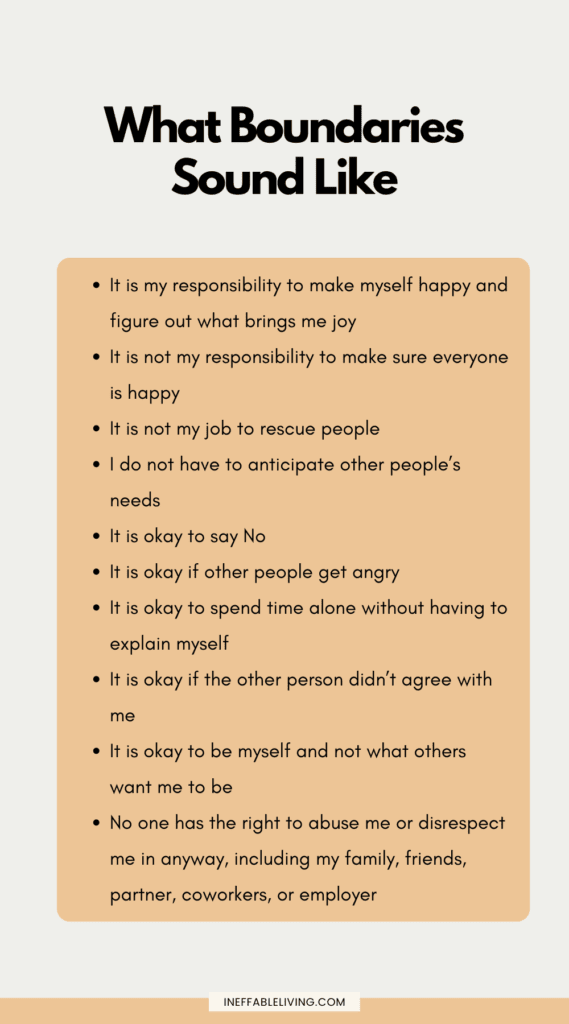
30. Just Say No
Many people struggle with saying “No” to other people’s demands, whether it was to please others or simply out of generosity. By not setting healthy boundaries, you risk burning out.
If you’re afraid people might disapprove, then that means one of two things:
* They are not emotionally healthy people. They don’t know how to set boundaries themselves and so they are incapable of recognizing and respecting others’ boundaries.
* They don’t respect you or your value system.
Related: Top 5 Tips On How To Be Assertive Without Being Rude
31. Try Minimalism
Clutter can overwhelm your mind and increase your stress.
If you find yourself feeling claustrophobic in your home and that there’s not much room to move around, maybe it’s time to consider decluttering your place.
32. Make Your Home Your Haven
Your home is your shelter, where you feel most protected and where you recharge after a long day. Take the time to make your home comfortable and cozy.
Here are a few things you can do to get your home a step closer to Zen:
* Buy non-toxic, scented candles
* Add comfortable pillows and throws to create a cozy atmosphere.
* Get dimmable lighting to control the mood of a space.
* Use a diffuser with your favorite essential oil.
33. Adopt Some Plants
Studies reveal that plants have a positive impact on our mental and physical health such as improving air quality and humidity levels, reducing stress, making people calmer and happier, reducing workplace negativity, speeding up recovery from illness, improving concentration, productivity and creativity, and the list goes on. (10)
Spend as much time in nature as you can and try brining nature to you. Get yourself a houseplant, or start a window herb garden. Try common herbs like basil, chives, cilantro, oregano, or parsley that you can use to prepare your meals.
34. Go on a Digital Detox
A great way to purposefully give yourself a break from the stressful fast pace of our world, is to unplug digitally as often as possible.
But putting your phone down isn’t just important for your mental health.
Putting your phone or computer away one hour before sleep will help improve the quality of your sleep.
And when going out with friends or spending time with loved ones, putting your phone down will make you pay more attention to others and actually enjoy their company.
Related: Are You Addicted To Your Phone Quiz (+Digital Detox Challenge)
EMOTIONAL SELF CARE
35. Affirmations
An affirmation is a positive statement, written or spoken, that replaces patterns of negative thinking with patterns of positive thinking.
The more you repeat positive affirmations to yourself, the more you will improve your mood, boost your confidence, and elevate your outlook.
Self-Love Affirmations
- I am worthy of love.
- I deserve to be loved and treated with respect.
- I am loved for exactly who I am.
- I deserve love and I open my heart to it.
- I am worthy of a healthy and loving relationship.
- I am loved more than I ever thought possible.
- Love surrounds me and everyone around me.
- When I look in the mirror, I see pure love.
- Love is unlimited.
- When I wake up, my first thoughts are thoughts of love.
- I am overwhelmed with love!
- I accept love from myself.
- I am at peace with where I am right now.
- I accept myself unconditionally.
- I radiate confidence, love, and joy.
How to use affirmations
Say it. Say the affirmation confidently and with conviction at least twice a day.
Write it. Write your affirmation over and over again.
Post it. Write your affirmation on sticky notes and place them when you can see them every day (bathroom mirror, car dashboard, desk, refrigerator, etc.)
Hear it. Record yourself saying the affirmation and play the recording when you’re sitting in silence or driving in your car.
Related: Best 100 Self Care Affirmations To Honor Yourself
36. Check In on Your Emotions
When you’re constantly moving from one thing to the next, you might not make the time to check in on your emotions.
It’s important to check in with yourself as often as possible. Do you feel tired? Stressed? Overwhelmed? If so why do you feel this way and how can you take better care of yourself.
Related: How To Feel Your Feelings & Sit With Painful Emotions? (Top 9 Difficult Emotions)
37. Get a Good Laugh
Studies show that laughter can be a great stress buffer. It doesn’t matter how intense the laughter is — even smiling helps. (11)
Not only does laughter reduce stress hormones in your body, but it also releases endorphins – the body’s feel-good chemical.
Related: How To Have A More Fulfilling Life And Find Happiness Within Yourself
38. Grounding Exercise
There are many proven benefits of grounding, including decreased levels of pain, reduction of stress and anxiety, improved immune system, etc.
1. Find an outdoor area: grass, soil, or anything safe for your feet.
2. Stand barefoot for five to ten minutes
3. Breathe deeply while noticing the feeling of the ground under your feet.
4. Walk barefoot on the ground for another five to ten minutes.
5. Try to incorporate getting your bare feet into nature at least two days a week.
Related: Top 23 Grounding Affirmations
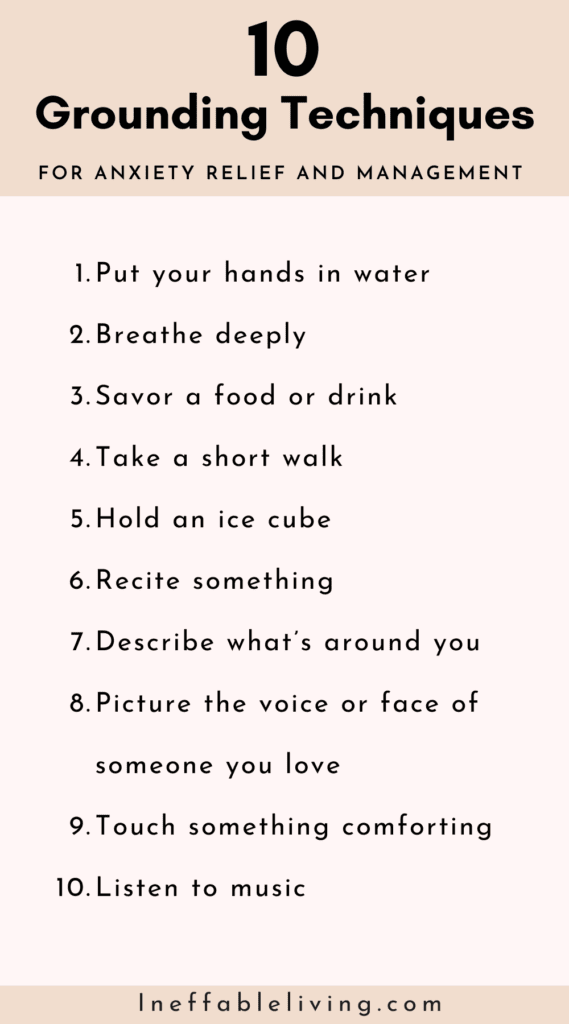
39. Breathe Deeply
Take a breath in through your nose, hold for 5 seconds, and breathe out through your mouth. This simple mindful breathing exercise helps reduce your stress level, relieve pain, and increase your energy.
Apps like Prana Breath, MindShift CBT, Breath Ball, and Health through Breath can help make breathing exercises easier.
Related: Best 8 Mindfulness Exercises For Adults That Will Help You Regulate Your Emotions
SOCIAL SELF-CARE
Social self-care is about nurturing your need for connection with other people. It involves taking care of existing relationships and friendships, creating new ones, and establishing healthy boundaries in relationships.
40. Create a Social Self-Care Plan
Spend some time getting clear on how you want your social like to look like:
1. List the safe people with whom you want to spend more time with.
2. Looking at your month’s calendar, select two or three dates and times you would be willing to set aside to do something together with these people.
3. Share your plans with them and stay flexible. If they don’t reach out or are not available, consider alternate dates or reaching out to different people.
41. Hide A Love Note For Someone Special
It can be something as simple and heartfelt as “I love you,” or a favorite quote or poem.
Pin it to their pillow or post it on the bathroom mirror.
Related: Best 50 Ways To Stay In Love Forever With Your Partner
42. Ask For Help
Receiving is a skill that can be learned and strengthened. It helps you bring more balance into your life and relationships.
One of the main reasons why people struggle to receive is either because they don’t believe they deserve to ask for what they need, or because they don’t know exactly what they need, or both.
Connect with your deepest desires and practice assertiveness in asking for what you need.
SPIRITUAL SELF-CARE
43. Meditation
Meditation is not about having a completely clear or empty mind.
Meditation is about mindfully acknowledging your thoughts as they arise and consciously shifting your focus back to your breathing.
Creating a distance between your thoughts and your attention can help you understand your own motivations, desires and help clear your head.
Some of the best indicators of the emotions we’re experiencing are our physical signals. By tuning in to your physical sensations, you can develop greater awareness of your emotions.
1. Take a few moments to be still and enter the world of being rather than doing.
2. Begin this exercise by focusing on your breath and feeling into your body and mind and simply allowing any thought, emotion, or physical sensation to just be.
3. You don’t need to judge, analyze, or figure things out. Spend about three minutes simply checking in with yourself.
Apps like The Mindfulness App, Headspace, Calm, and buddhify can help introduce you to mindfulness and silent meditations.
Related: Best 6 Mindfulness Exercises For Beginners (+FREE Resources)
44. Manifestation
Manifestation is using your emotions, belief system, and visualization to bring something into your physical reality.
For example, manifesting a job could look like this:
I WANT a new job.
I know exactly the kind of job I want.
I can SEE myself doing this job in vivid detail.
I put my thoughts and energy toward manifesting that job in my life.
I find an opening searching on the internet, and it sounds like the perfect fit.
I submitted my resume, got an interview, and went into the interview believing the job would be mine.
I got the JOB!
45. Become More Patient
Patience is a skill that takes practice. When you become more patient with others, situations, and yourself, you become more peaceful. This helps you manage stress better and enjoy your life more.
Free Printable Worksheets For Self-Care (PDF)
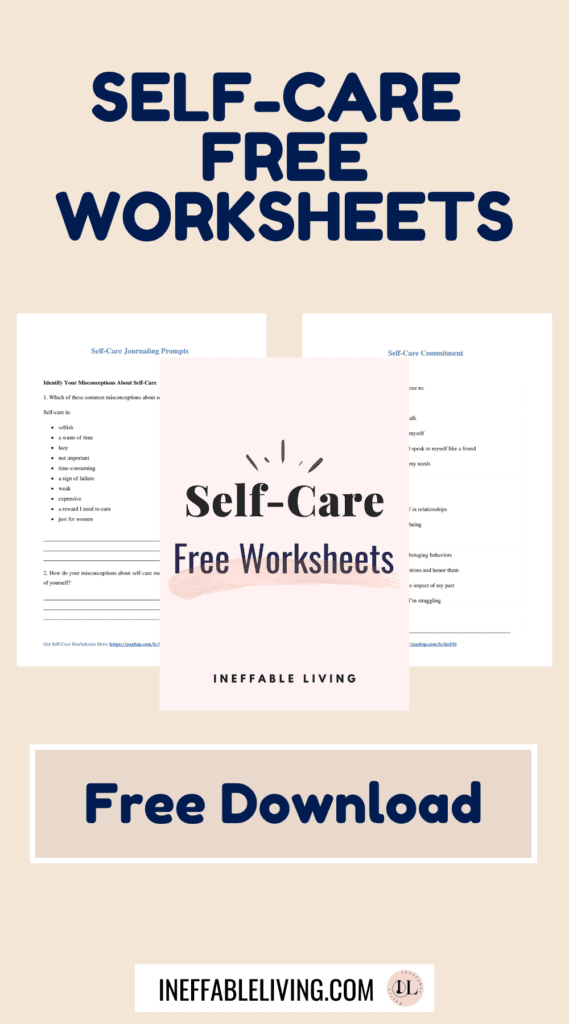
Give Yourself Permission
Giving yourself permission will help you commit to your self-care plan, especially when you’re experiencing feelings of guilt or are unfamiliar with self-care.
Use the following statement:
I give myself permission to………………………(self-care activity) as a way of taking care of…………..(need)
How Can You Practice Self-Care Every Day Even When Time Is Hard to Find?
1. Create Rituals
The key to permanent change is repetition and consistency and the best way to ensure that is through rituals.
Morning Ritual
Wake up thirty minutes earlier (or even twenty) and start a mood- and energy-boosting ritual. That might include:
- Stretching
- Meditation
- Practicing deep breathing
- Yoga
- A refreshing beverage
- Reading a few pages
- Listening to an audiobook
- Journaling
- Reading affirmations
- A morning skincare routine
- Etc.
Related: Morning Routines: The Definitive Guide to Design Your Perfect Morning Routine
Evening Ritual
Give yourself another twenty to thirty minutes before bedtime for an evening ritual to help you slow down, soothe and relax, and prepare you for a restful night of sleep. That might include:
- Stretching before bed to relax your muscles
- Meditating to clear your head
- Having a soothing beverage like chamomile tea
- Doing your evening skincare routine
- Writing in your gratitude journal
- Etc.
Related: 18 Proven, Healthy Ways to Sleep Better at Night and Wake Up Rested
2. Find Opportunities In Delays
you can turn delays into opportunities by using that time to practice self-care activities.
If your train trip is delayed, your doctor is running behind on appointments, or your friend is late for lunch, you can turn delays into opportunities by using that time to practice self-care activities.
- Read a book
- Read your favorite blogs
- Listen to an audiobook
- Call or text a loved one
- Enjoy the quiet time
- Ect.
The Big List of Self-Care Ideas PDF
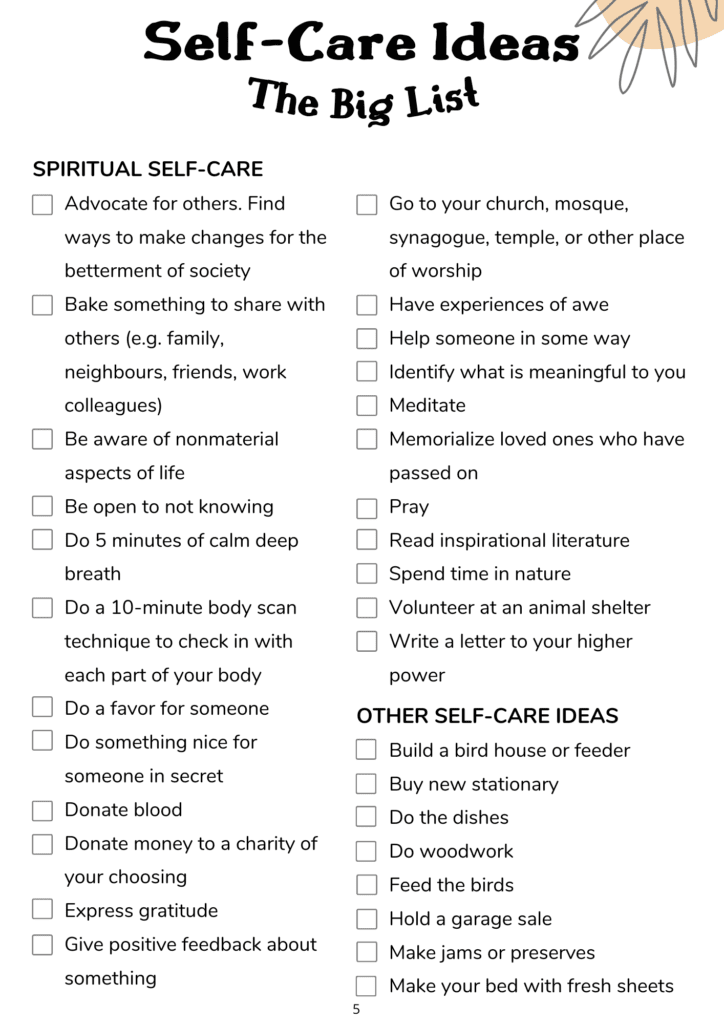
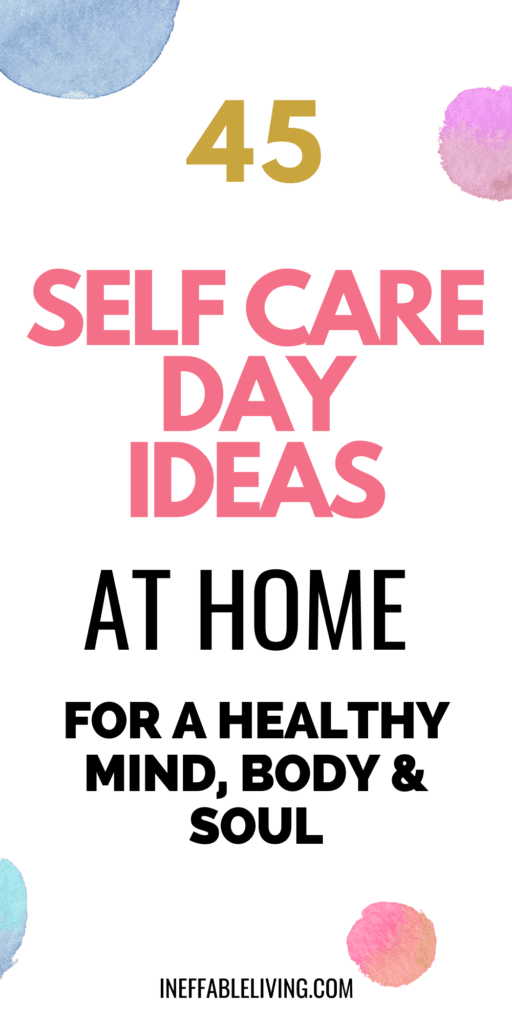
References
- Self-care research: Where are we now? Where are we going? – ScienceDirect
- The experience of self-care: a systematic review – PubMed (nih.gov)
- Self-care: A concept analysis – PMC (nih.gov)
- What Is Self-Care and Why Is It Critical for Your Health? | Everyday Health
- International Center for Self-Care Research | (selfcareresearch.org)
- Self-care has never been more important (apa.org)
- Self care interventions to advance health and wellbeing: a conceptual framework to inform normative guidance | The BMJ
- Frontiers | The Role of Self-Care Activities (SASS-14) in Depression (PHQ-9): Evidence From Slovakia During the COVID-19 Pandemic | Public Health (frontiersin.org)
- The unspoken truth about self-care (apa.org)
